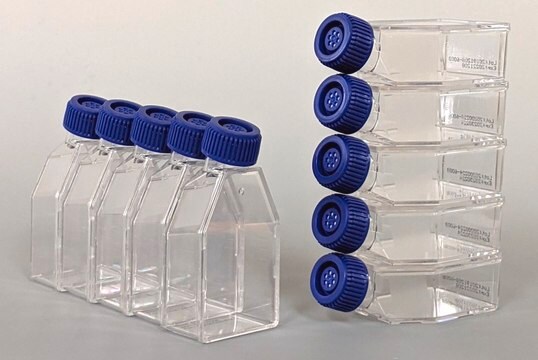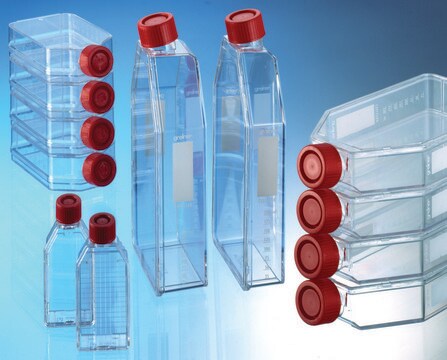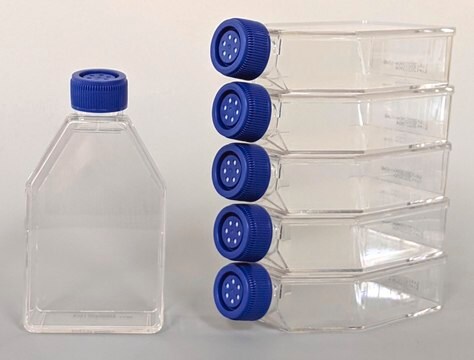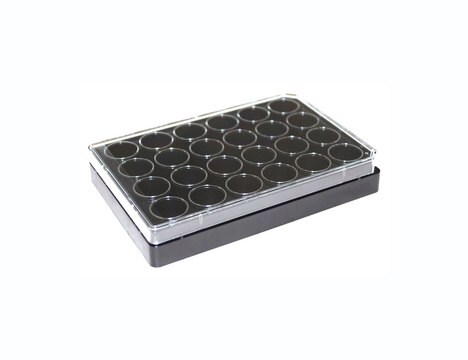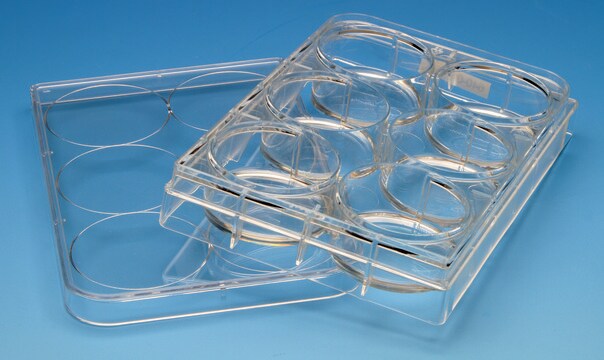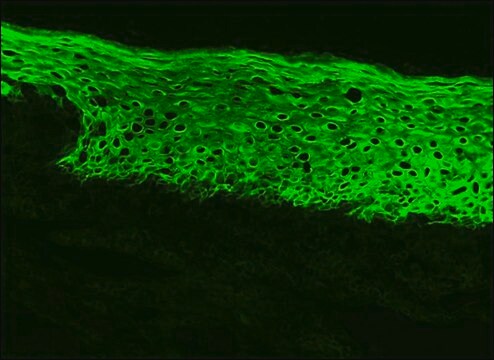CC336
CytoSoft®T-25 Flasks
Elastic Moduli 64 kPa
Sinônimo(s):
T25 cell culture flask
Faça loginpara ver os preços organizacionais e de contrato
About This Item
Código UNSPSC:
41106514
NACRES:
NB.13
Produtos recomendados
Nível de qualidade
embalagem
flask of 10 ea
técnica(s)
cell culture | mammalian: suitable
temperatura de armazenamento
room temp
Procurando produtos similares? Visita Guia de comparação de produtos
Categorias relacionadas
Descrição geral
Instructions For Use
Coating Procedure
Note:Use these recommendations as guidelines to determine the optimal coating conditions for your culture system. The bottom of the plate can be detached by excessive mechanical force such as centrifugation or direct contact with liquid handling tools (tips, pipettes, etc.).
1. Remove the CytoSoft® product from the protective sleeve in a sterile hood.
2. Prepare extracellular matrix material by neutralizing in amine-free buffer pH 7.4 to 7.9 (such as 1X DPBS). We do not recommend using gelatin as your ECM protein. Note: Pre-warm the coating solution to approximately room temperature before use.
3. Dilute as needed, and dispense 1 mL of solution into each well to coat the surface. Note: Recommended dilution for PureCol™ Type I collagen is 1:30 (~100 µg/ml). Note: The hydrophobic surface requires larger volumes to cover the surface than do conventional plastic dishes
4. Incubate ECM coated CytoSoft® at room temperature, covered for 1 hour.
5. After incubation, aspirate any remaining material and rinse coated surfaces immediately two times with culture medium or PBS. Leave about 2.5 mL of medium per well to keep surface covered. Note: Do not allow the CytoSoft® surface to become dry once the surface has been wetted.
6. Coated surfaces are ready for use. Standard harvesting procedures used for removing cells from cultureware can be employed for harvesting cells from the CytoSoft® product including use of trypsin, Accutase® and non-enzymatic cell detachment solutions.
Coating Procedure
Note:Use these recommendations as guidelines to determine the optimal coating conditions for your culture system. The bottom of the plate can be detached by excessive mechanical force such as centrifugation or direct contact with liquid handling tools (tips, pipettes, etc.).
1. Remove the CytoSoft® product from the protective sleeve in a sterile hood.
2. Prepare extracellular matrix material by neutralizing in amine-free buffer pH 7.4 to 7.9 (such as 1X DPBS). We do not recommend using gelatin as your ECM protein. Note: Pre-warm the coating solution to approximately room temperature before use.
3. Dilute as needed, and dispense 1 mL of solution into each well to coat the surface. Note: Recommended dilution for PureCol™ Type I collagen is 1:30 (~100 µg/ml). Note: The hydrophobic surface requires larger volumes to cover the surface than do conventional plastic dishes
4. Incubate ECM coated CytoSoft® at room temperature, covered for 1 hour.
5. After incubation, aspirate any remaining material and rinse coated surfaces immediately two times with culture medium or PBS. Leave about 2.5 mL of medium per well to keep surface covered. Note: Do not allow the CytoSoft® surface to become dry once the surface has been wetted.
6. Coated surfaces are ready for use. Standard harvesting procedures used for removing cells from cultureware can be employed for harvesting cells from the CytoSoft® product including use of trypsin, Accutase® and non-enzymatic cell detachment solutions.
CytoSoft® T-25 flasks have a defined elastic modulus in the bottom of a standard T-25 flask for cell expansion applications. The thickness of the silicone gel is uniform with a ~0.5 mm thick layer of silicone in each flask that is fully compatible with mammalian cell cultures. The silicone gels are activated and ready to bind to a purified ECM, such as PureCol™ type I collagen (#5005) prior to cell addition. The plates are packaged sterilized, and provided with 10 flasks per package.
The rigidity of the substrate to which cells adhere can have a profound effect on cell morphology and gene expression. CytoSoft® products provide a tool to culture cells on substrates with various rigidities covering a broad physiological range. On the bottom of each flask, there is a thin layer of specially formulated biocompatible silicone, whose elastic modulus (rigidity) is carefully measured and certified. The surfaces of the gels in CytoSoft® products are functionalized to form covalent bonds with amines on proteins. This chemical functionalization is stable and the reaction does not require a catalyst, facilitating the coating of the gel surfaces with matrix proteins and plating cells.
The silicone substrates of CytoSoft® products are optically clear and have a low auto-florescence. The layer of silicone in each flask is firmly bonded to the bottom of the flask. Unlike hydrogels (such as polyacrylamide gels), silicone gels are not susceptible to hydrolysis, do not dry nor swell, are resilient and resistant to tearing or cracking, and their elastic moduli (rigidities) remain nearly unchanged during extended storage periods.
CytoSoft® products accommodate the harvesting of cells using enzymes such as trypsin and collagenase. There is no biochemical breakdown of the substrate during or after enzyme treatment, and there are no residuals of the substrate in the sample retrieved from a CytoSoft® plate.
The rigidity of the substrate to which cells adhere can have a profound effect on cell morphology and gene expression. CytoSoft® products provide a tool to culture cells on substrates with various rigidities covering a broad physiological range. On the bottom of each flask, there is a thin layer of specially formulated biocompatible silicone, whose elastic modulus (rigidity) is carefully measured and certified. The surfaces of the gels in CytoSoft® products are functionalized to form covalent bonds with amines on proteins. This chemical functionalization is stable and the reaction does not require a catalyst, facilitating the coating of the gel surfaces with matrix proteins and plating cells.
The silicone substrates of CytoSoft® products are optically clear and have a low auto-florescence. The layer of silicone in each flask is firmly bonded to the bottom of the flask. Unlike hydrogels (such as polyacrylamide gels), silicone gels are not susceptible to hydrolysis, do not dry nor swell, are resilient and resistant to tearing or cracking, and their elastic moduli (rigidities) remain nearly unchanged during extended storage periods.
CytoSoft® products accommodate the harvesting of cells using enzymes such as trypsin and collagenase. There is no biochemical breakdown of the substrate during or after enzyme treatment, and there are no residuals of the substrate in the sample retrieved from a CytoSoft® plate.
Aplicação
Young′s elastic modulus: 52.0-74.0 kPa
Sterility: Ozone
Cell attachment: Tested
Cell growth: Tested
Sterility: Ozone
Cell attachment: Tested
Cell growth: Tested
Armazenamento e estabilidade
Store CytoSoft® Imaging plates at room temperature.
Outras notas
Elastic Moduli 64 kPa
Informações legais
Accutase is a registered trademark of Innovative Cell Technologies, Inc.
CytoSoft is a registered trademark of Advanced BioMatrix, Inc.
PureCol is a trademark of Advanced BioMatrix, Inc.
Exoneração de responsabilidade
Unless otherwise stated in our catalog or other company documentation accompanying the product(s), our products are intended for research use only and are not to be used for any other purpose, which includes but is not limited to, unauthorized commercial uses, in vitro diagnostic uses, ex vivo or in vivo therapeutic uses or any type of consumption or application to humans or animals.
Código de classe de armazenamento
13 - Non Combustible Solids
Classe de risco de água (WGK)
WGK 3
Ponto de fulgor (°F)
Not applicable
Ponto de fulgor (°C)
Not applicable
Certificados de análise (COA)
Busque Certificados de análise (COA) digitando o Número do Lote do produto. Os números de lote e remessa podem ser encontrados no rótulo de um produto após a palavra “Lot” ou “Batch”.
Já possui este produto?
Encontre a documentação dos produtos que você adquiriu recentemente na biblioteca de documentos.
Nossa equipe de cientistas tem experiência em todas as áreas de pesquisa, incluindo Life Sciences, ciência de materiais, síntese química, cromatografia, química analítica e muitas outras.
Entre em contato com a assistência técnica